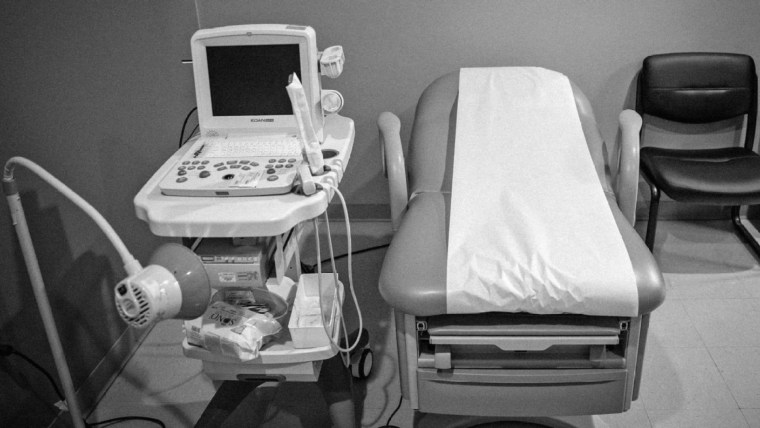This article is part of a special series called “One in four: How abortion access shapes America.”
As an OB-GYN providing abortion care in Tennessee, I’ve collected a number of stories that will stick with me forever. Some stay with me because of the desperation, despair and moral distress of not being able to provide care due to my state’s restrictive abortion laws. But even some cases where patients do get their desired abortions weigh on my mind, long after a patient has been in my care.
When I graduated from medical school and started OB-GYN training in Memphis, Tennessee, my plan was to be a high-risk OB. I was going to learn from a leading authority on pre-eclampsia and be part of making the miracle of pregnancy and birth safer. I quickly realized that while trying to improve outcomes for moms and babies was an admirable goal, the safest option for many of these patients was to not be pregnant. I pivoted and focused my career on contraception and abortion care while continuing to be a full-spectrum OB-GYN.
While trying to improve outcomes for moms and babies was an admirable goal, the safest option for many of these patients was to not be pregnant.
Before June 2022, I provided abortion care in situations where the pregnancy was complicated by significant fetal abnormalities or maternal health risks while also training the future generation of OB-GYNS on contraception and abortion care.
With the Supreme Court’s 2022 Dobbs decision and the Tennessee “trigger ban,” everything changed. The way the 2019 law was written, ending any pregnancy was a felony. The word “exception” was nowhere in the law. The letter of the law made caring for women with ectopic, molar or miscarrying pregnancies a felony — because the treatment is ending the pregnancy.
We were no longer able to offer care for any fetal indications. The line for when we could offer a termination to save a woman’s life was vague. Instead of providing needed medical treatment, my colleagues and I would find ourselves discussing, “Did she need to have a 30% chance of death or irreversible harm? Or does it need to be at least 50%?”
My team and I continued to take care of patients as we tried to define our new normal. Rarely did a day go by that I did not get a call, text or email asking me what we could tell a patient, where a patient could get abortion care, or whether a given patient could get care in Tennessee or not. I have hundreds of examples of patients impacted by Tennessee’s ban.
One in particular sometimes keeps me up at night. Shortly after the Dobbs decision, I got a call from a longtime patient telling me that her 16-year-old daughter had gotten pregnant, that she had taken her to North Carolina for an abortion. She hoped I would see her daughter for post-abortion and contraceptive care. At the appointment, both the mom and daughter, independently of each other, told me, “I don’t believe in abortion, but...”

Normally I would just nod and let it go. That day, I couldn’t. I told the daughter how fortunate she was that she felt safe telling her mom she was pregnant and that her mom respected her autonomy and agreed that an abortion would allow her to finish school and have the future she planned. I told the mom that they were blessed to be able to afford to go across state lines and lucky that they only had to travel three hours each way.
I also asked them to treat others as they hoped to be treated if their friends should learn about the daughter’s abortion. I couldn’t stop thinking about so many other patients I’d met who couldn’t get the abortion care they needed.
Another patient I think of often was also someone I had provided long-term care for and came to see me in early 2024. She had delivered two babies with our practice and wanted one more to complete her family. Because she was over 35, she and her husband requested perinatal genetic screening. The maternal fetal medicine specialist called me while the patient was still in her office. The ultrasound was diagnostic for a rare anomaly that is not compatible with life.
I spoke with the patient the next day. She and her husband had Googled the disorder and were leaning toward terminating the pregnancy. The couple really had never considered abortion, but they understood that if this baby were to survive pregnancy and birth, it would not live more than a couple of days, and delivery would require a cesarean, which they were worried could affect future pregnancies.
I know many families that could not take the time off work, or get child care, or pay for gas, let alone the procedure.
Even though it’s been almost two years since Dobbs and the enactment of our state ban, they did not understand that I could not care for them in Tennessee. They did not put together the fact that the care they needed was in fact an abortion. They also did not realize that Tennessee legislators had declined to add an exception to the “Human Life Protection Act” for life-limiting fetal anomalies because they did not trust families and doctors.
We were able to help this family get the care they desired out of state. But I know many families that could not take the time off work, or get child care, or pay for gas, let alone the procedure.
These patients will forever be changed by their experiences. And they were among those able to access abortion care. As far as ensuring patients get the care they need, these are success stories. But they stick with me because they illustrate so starkly how so many people exclude themselves from the category of people who will need abortion care — until the need arises.
Abortion is a complicated issue that must be individualized for the patient, their family and their health care team — not legislated. It is hard to quantify the impact, because abortion is stigmatized and not discussed or reported, but I see the distress for patients, families and physicians these bans are causing. We need to vote to protect abortion rights on Nov. 5.
